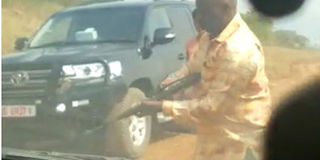We deserve elections without violence

Chaotic electoral processes characterised by violence are not new in Uganda’s political history. The just concluded NRM party elections were not different. At the weekend, one Dan Rweiburingi was reported to have been shot in a poll related commotion. He was taken to hospital in critical condition.
A recording circulated on social media on Saturday showed state minister for Labour, Mwesigwa Rukutana, picking a gun from a person believed to be his bodyguard during a scuffle.
The minister is currently under detention.
Across the country, there were several reports of chaotic scenes and fist fights. Another recording showed the contestants for the Mbale Woman MP seat engaging in a bitter squabble. They had to be physically separated to avert a fight.
These scenes of violence remind us of the daily reports during election time: Harassment and intimidation of voters mostly committed by contestants who have money, influence, power, and guns! What we have witnessed in the ruling party primaries will get worse as the stakes go higher after nominations and when official national campaigns kick off.
During the 2015 NRM primaries, for instance, there were sustained protests of vote rigging and other electoral malpractices to an extent that party offices in Ssembabule and Isingiro districts were set ablaze and police officers held captive for hours. In another incident, a man nearly lost his legs after he was brutally attacked with a panga in a fight between rival supporters.
There are several examples of election related violence resulting from election malpractices and the desire to win by hook or crook. There are tragic cases where people have been killed. This affects Uganda’s chances of holding a free and fair election, especially given that many perpetrators of electoral violence get away with it.
This country has for long harboured the despicable culture of arrogance and impunity where some politicians can get away with repressive and violent behavior against their opponents. But we demand better, because Uganda deserves better. This is precisely why Ugandans must speak up against such actions and people who use their money, power and guns to undermine the integrity of our electoral processes.
As we head towards nominations, our political leaders should recognise that there is life beyond elections and political offices. It should not be a do or die. It should not make politicians throw out basic human decency and treat opponents like enemies.
We should not allow violence to define our electoral processes when we have the opportunity to conduct a decent, transparent and civil exercise.




